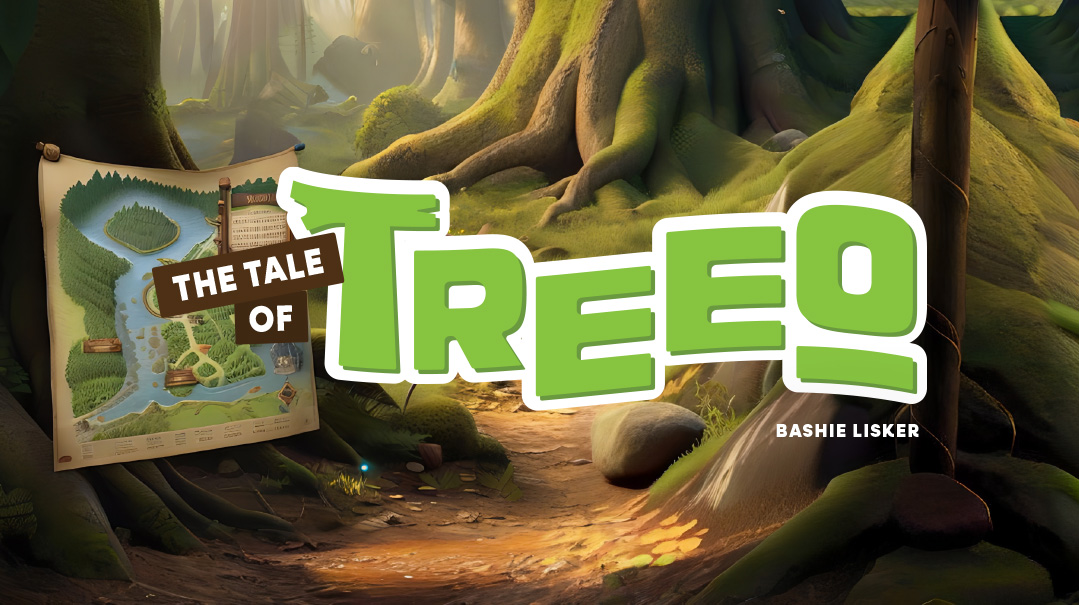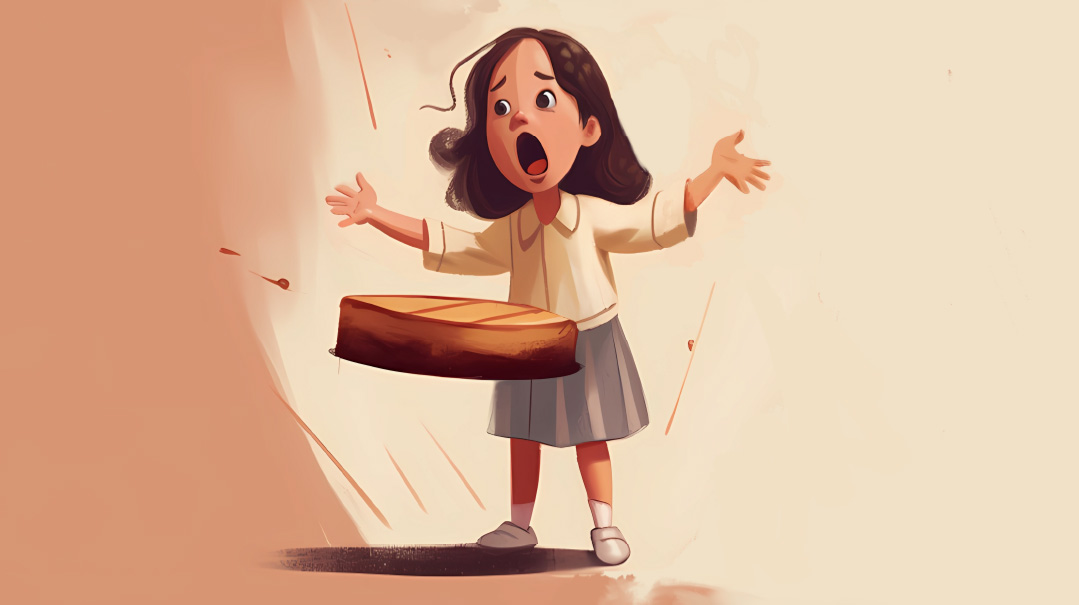The Storytellers: Part 7

“Nu?” Smadar feels like she’s holding her breath. She knows what a big deal these things are for Margalit

“How can this be? It can’t be! We missed this?!” Smadar is beyond confused, looking at this previously unseen object. “We’ve already examined everything in this box multiple times! And now this is just here?”
“I don’t know, I don’t know!” Margalit says. “But we have to hurry! Your parents are waiting, you’ve got to go. Let’s just do this quick.”
At the bottom of the box lies a ceramic knob, the kind used to open a drawer. It’s white with a fine blue design on it, like those delft tiles the Dutch are so famous for. Margalit picks it up. Rolls the cold knob in her fingers. Feels its weight in her palm. Waits. Nothing. Just nothing. Eyes wide, confused, she looks to Smadar, hoping she can answer this, resolve the mystery.
Smadar takes the knob, now warm, in her hand, holds it in her open palm. “Huh.”
“I know.” Margalit purses her lips. “So strange. No story yet.”
The two girls look at it.
“You know,” Margalit says slowly, “I think Abuelita used to have knobs like this on the antique chest of drawers in her bedroom. She gave away the drawers a long time ago, to one of the aunts maybe….”
Smadar nods, even though the truth is she has no idea. If she’d ever seen such a piece of furniture in Abuelita’s bedroom, it had been many years ago. But somehow it just makes sense. Something of Abuelita’s needs to be in the box, part of the whole picture.
Smadar rolls the drawer pull between her thumb and forefinger, rubbing the metal piece at the tip. “It doesn’t seem like this knob has a story,” she says at last.
“No, I disagree,” Margalit says, her voice firm. “It does.” She swallows. “We’ll just have to make it up.”
Before they know it, the cousins are parted once again. But this time is different. The girls keep up over the months. They keep talking about the stories, sharing ideas about what to do with them. Smadar joins the literary magazine at school and starts to write her own poems and short stories. Slowly, slowly she begins to let go of a bunch of other activities she felt she had to do just to be well-rounded, perfect. Goodbye, swimming. Goodbye, debate club. Goodbye, G.O.
One morning, in class, another girl calls her a writer, and Smadar is surprised — and quite pleased — to realize the description really fits. She intends to tell Margalit about this development on the phone the next time they speak. But Margalit has something to tell her instead.
“You know how much I hate going around with a big group of girls, right?” Margalit says. “I’m like the ugly duckling in a bunch of swans.”
“Noooo!” Smadar rushes to disagree. “You’re the swan — they’re loons.”
“Okay, whatever,” Margalit giggles. “That’s not nice! But anyway, there was this Melaveh Malkah, and I wasn’t even sure if I should go. I just always end up feeling so awkward and like a social failure at these things, you know?”
“Mm-hmm,” Smadar says. “It’s all in your head, but whatever.”
“No,” Margalit argues. “But anyway, I decided I should go. The Melaveh Malkah is like this big deal and there’s only one a year…” Her voice trails off for a moment.
“I was really hesitant,” she continues, “but I put my name on the list.” She clears her throat. “A few days later, the head of the Melaveh Malkah planning committee came up to me. She’s, like, really popular and perfect, but she’s also always been nice to me. Anyway, she says they need someone to tell some stories there, between the meal and the kumzitz.” She laughs a little. “I told her they should get a rav, and she said they’re having a rav, but after, later, they want me.”
“Nu?” Smadar feels like she’s holding her breath. She knows what a big deal these things are for Margalit.
“So, I said yes!” Margalit breathes. “And then I went, and I had this whole plan that I’d just pretend to be the person I’d like to be. But guess what?” She doesn’t wait for Smadar to guess. “I didn’t need to pretend. It was just good. I told some of Abuelita’s stories, and everyone thought they were absolutely amazing, and I was so proud of myself and happy and I just felt like I relaxed or something and suddenly I was part of things.” Her words tumble out.
What Margalit doesn’t say, because she is sensitive about it and because she doesn’t want to sound like a neb, is that if she would have written down all the times she’d felt left out and left behind in her life, she would have run out of paper. That heading to the Melaveh Malkah, she’d felt like a bird flying against the wind, like a hermit crab scrambling across the ocean floor without a shell, like a baby turtle struggling up and out of the sand, toward the sea. (She also didn’t say those things aloud because they really do make her sound weird. But she is okay with having those thoughts, and that okayness is something, too.) This was the first time in recent memory, maybe the first time in forever, that she’d felt like she belonged. And it was all thanks to Abuelita’s box and its stories.
“Margalit,” Smadar says when Margalit lapses into silence. She can’t say any more because her throat is all clogged with emotion. But Margalit knows what she means. Both girls are silent in the moment, flooded with a kind of shortcut love and happiness for each other.
Things are changing for both of them. Abuelita’s box — and the stories inside — have everything to do with it.
One Year Later
An anonymous envelope arrives in the offices of a popular children’s magazine. There is no formal letter inside, no introduction, just a short note, handwritten on a piece of stationery with a little starling in the corner. It’s paperclipped to a set of typed pages. “A submission,” it says.
Titled “The Storybox,” the pages contain stories, each with its own name. They’re brilliant. Stories unlike anything the editors have ever read or published before. The magazine puts forth a call — in the form of a recurring weekly ad — for the author of the stories to come forward. A few weeks later, another envelope arrives. Inside is another short note, handwritten. “Just publish them anonymously.”
So the magazine does. Each week a new story, a new segment. The feedback is tremendous. The readers love them, clipping them from the pages, saving them in binders, hoping maybe to form a collection. Everyone speculates. Who is the author? Why does he or she choose to remain anonymous? How does he or she come up with such tales? Can they send in their own objects to “hear” the stories inside?
Over the invisible waves and signals that carry phone calls, two girls are connected, one in America, one in Panama. Beside each girl is a new wooden box, filled with tiny things. Many objects have been added over the years: special buttons, unusual seashells, a dried flower, a tin soldier, an antique key, and more. Each with its unique story.
Enjoying the silence of knowing they’re each at their own end of the line, one of the girls finally speaks. “I think Abuelita would be proud,” she says. “Yes,” says the other, her voice growing thick with emotion. “She would.”
The End. Or is it really just the beginning?
The End
(Originally featured in Mishpacha Jr., Issue 945)
Oops! We could not locate your form.







